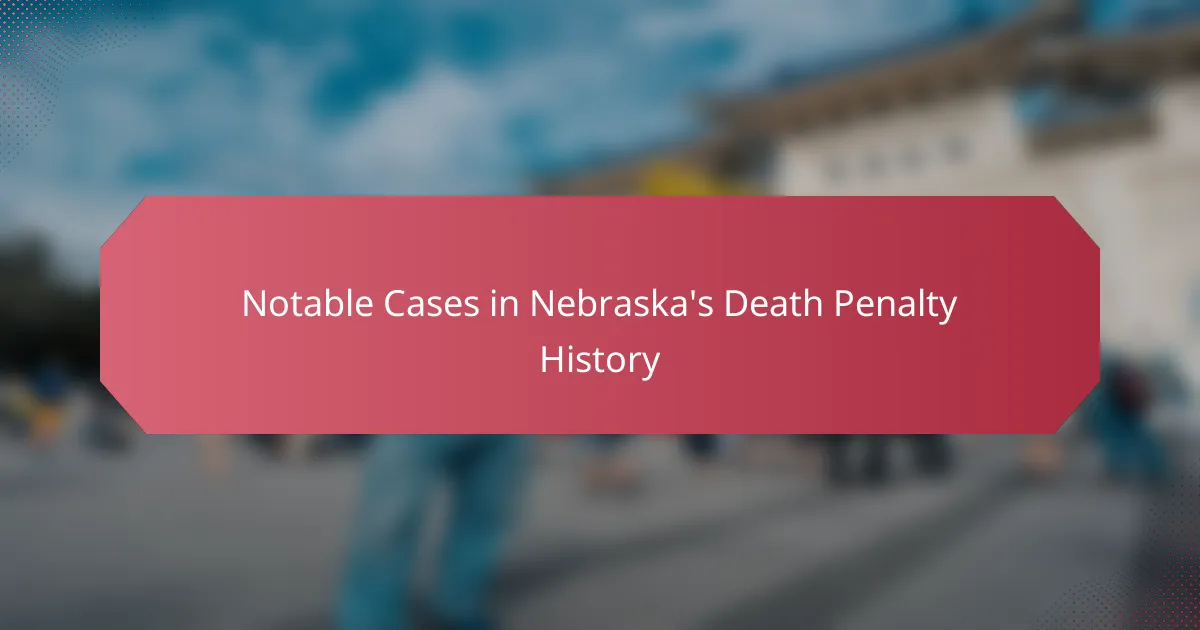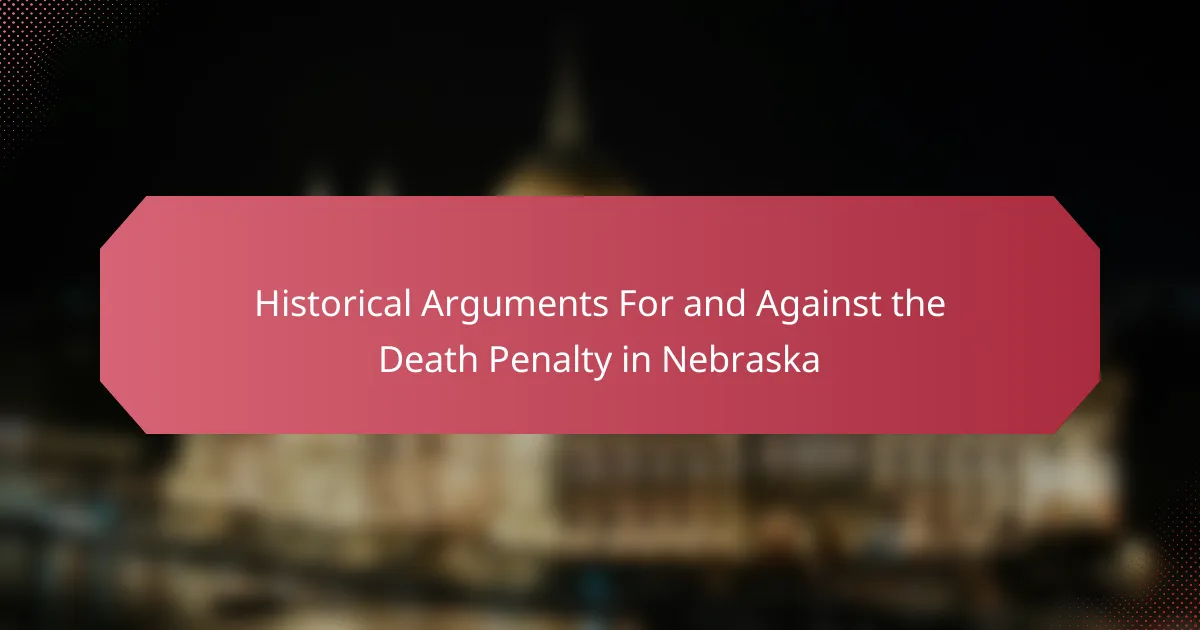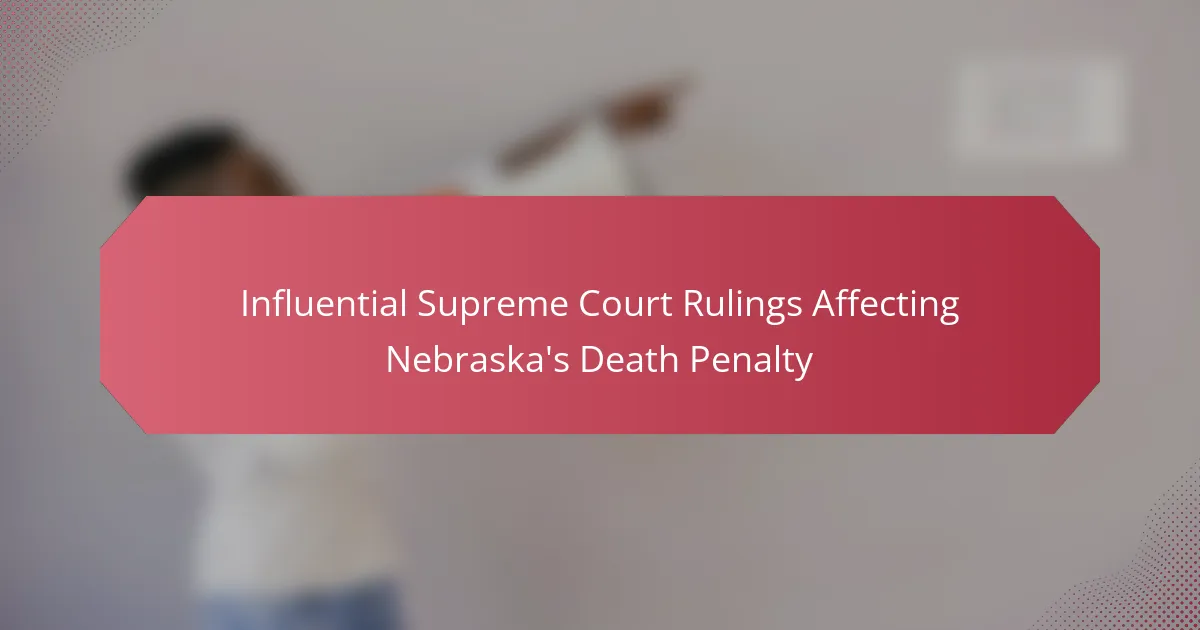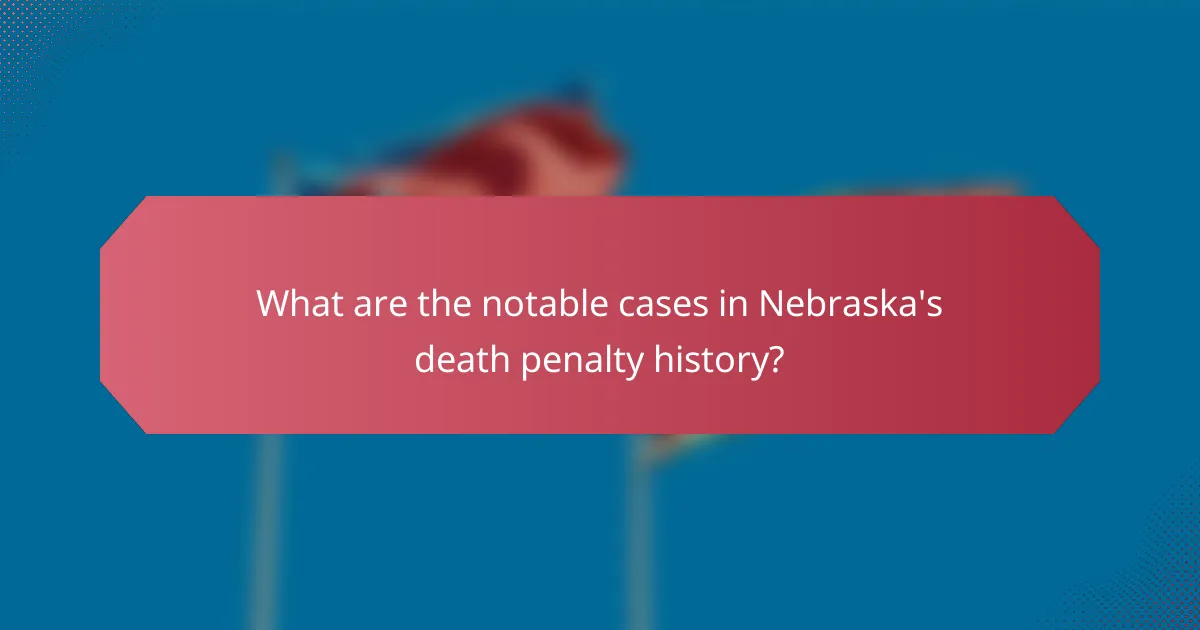
What are the notable cases in Nebraska’s death penalty history?
Notable cases in Nebraska’s death penalty history include the execution of Charles Starkweather in 1959. Starkweather was convicted for the murder of 11 people, including his girlfriend’s family. His case gained national attention and raised debates about the death penalty. Another significant case is that of Carey Dean Moore, executed in 2018. Moore was convicted for the 1976 murders of two cab drivers. His execution marked the first in Nebraska since 1997, highlighting the state’s fluctuating stance on capital punishment. The case of Michael Ryan also stands out; he was sentenced to death in 1980 for the murder of a woman and her child. Ryan’s case faced numerous appeals and legal battles, illustrating the complexities of death penalty cases in Nebraska.
How has the death penalty evolved in Nebraska over time?
The death penalty in Nebraska has evolved significantly since its inception. Initially, Nebraska adopted the death penalty in 1873. The state used hanging as the primary method of execution until 1903. In 1903, the electric chair was introduced as a more humane option. However, the electric chair was used infrequently, with only a few executions carried out.
In 1972, the U.S. Supreme Court ruled in Furman v. Georgia that the death penalty was unconstitutional, leading to a moratorium on executions in Nebraska. The state abolished the death penalty in 1979, replacing it with life imprisonment without parole.
In 1993, Nebraska reinstated the death penalty, adopting lethal injection as the primary method of execution. The state faced legal challenges regarding the drugs used for lethal injection. In 2015, the Nebraska legislature voted to repeal the death penalty again, but the repeal was overturned by a voter referendum in 2016, reinstating capital punishment.
As of now, Nebraska continues to grapple with the complexities of the death penalty, including public opinion and legal challenges.
What key legislative changes have influenced death penalty cases in Nebraska?
The key legislative changes that have influenced death penalty cases in Nebraska include the repeal of the death penalty in 2015 and its subsequent reinstatement in 2016. In 2015, the Nebraska Legislature passed Legislative Bill 268, which abolished capital punishment. This decision was based on concerns over the morality and effectiveness of the death penalty. However, in 2016, the Nebraska voters approved a referendum that reinstated the death penalty. This referendum was a significant response to public sentiment favoring capital punishment. These legislative actions have shaped the legal landscape surrounding death penalty cases in Nebraska.
How have public opinions shaped the death penalty’s application in Nebraska?
Public opinions have significantly influenced the application of the death penalty in Nebraska. Over the years, shifts in public sentiment have led to legislative changes regarding capital punishment. For instance, a 2015 repeal of the death penalty was driven by growing concerns over its morality and effectiveness. However, a subsequent 2016 ballot measure reinstated it, reflecting a resurgence in support among voters. Polls indicate that Nebraskans have fluctuated in their support for the death penalty, often correlating with high-profile cases and media coverage. The state’s approach to capital punishment has thus been a reflection of changing societal attitudes, demonstrating a direct link between public opinion and legislative action.
What are some landmark cases that defined the death penalty in Nebraska?
The landmark cases that defined the death penalty in Nebraska include State v. McGhee, State v. McCoy, and State v. Bruner. In State v. McGhee (1976), the Nebraska Supreme Court ruled that the death penalty did not violate the state constitution’s prohibition against cruel and unusual punishment. This case set a significant precedent for upholding capital punishment in Nebraska.
In State v. McCoy (1984), the court addressed the issue of proportionality in sentencing. The ruling emphasized that death sentences must be reserved for the most heinous crimes. This case refined the criteria for imposing the death penalty in the state.
State v. Bruner (2000) involved challenges to the constitutionality of Nebraska’s lethal injection protocol. The court upheld the method of execution, affirming that it met constitutional standards. These cases collectively shaped the legal landscape of capital punishment in Nebraska.
Who were the individuals involved in these landmark cases?
The individuals involved in notable landmark cases in Nebraska’s death penalty history include Charles Starkweather and his accomplice Caril Ann Fugate. Starkweather was convicted of multiple murders in 1958, leading to a significant trial that challenged the state’s death penalty laws. Another key figure is Michael E. H. McCoy, whose case in 1977 raised questions about the constitutionality of the death penalty in Nebraska. Additionally, the case of State v. Mata in 2015 involved the defendant, who was sentenced to death, prompting discussions on mental health considerations in capital punishment. Each of these individuals played a crucial role in shaping the legal landscape surrounding the death penalty in Nebraska.
What were the outcomes of these notable cases?
The outcomes of notable cases in Nebraska’s death penalty history include various legal rulings and sentences. In 1972, the Nebraska Supreme Court ruled the death penalty unconstitutional, leading to a moratorium. In 2008, the court upheld the death sentence of convicted murderer John Lotter. In 2015, the Nebraska legislature abolished the death penalty, overriding a gubernatorial veto. This decision marked a significant shift in state policy regarding capital punishment. These cases reflect changing societal views and legal interpretations surrounding the death penalty in Nebraska.
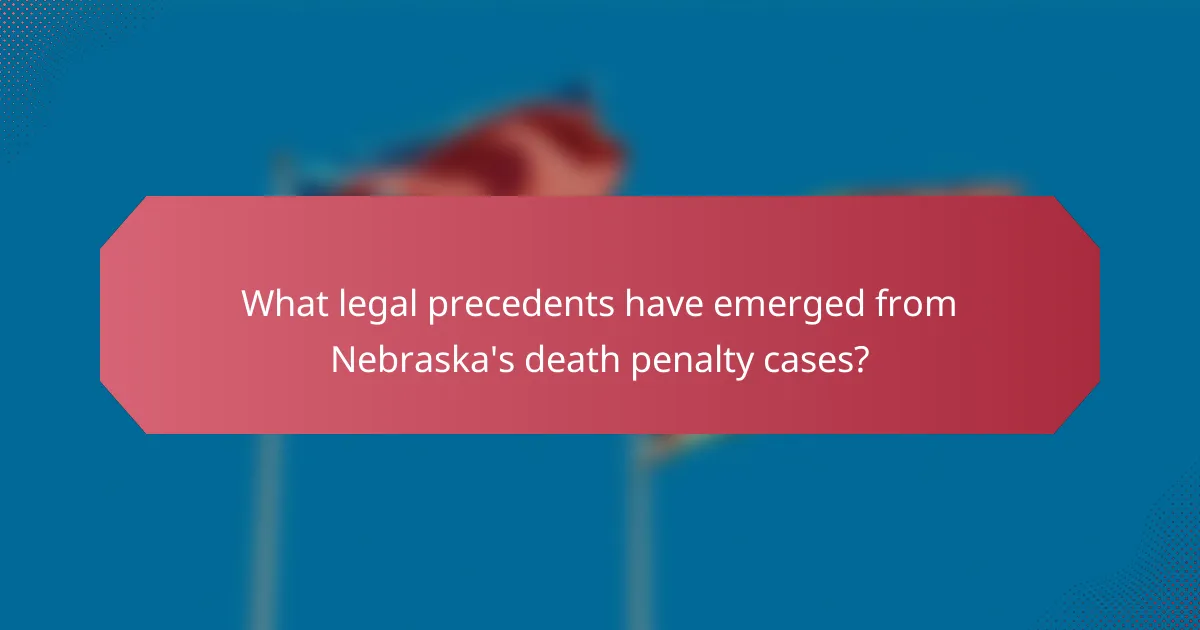
What legal precedents have emerged from Nebraska’s death penalty cases?
Nebraska’s death penalty cases have established several important legal precedents. One significant case is State v. Mata, where the Nebraska Supreme Court ruled on the constitutionality of lethal injection protocols. This decision emphasized the need for transparency in execution methods. Another key case is State v. McCoy, which addressed the issue of mental competency in death penalty sentencing. The court ruled that defendants must be competent to understand their punishment. Additionally, Nebraska’s 2015 repeal and subsequent reinstatement of the death penalty highlighted the legal complexities of legislative authority over capital punishment. These cases collectively shape the legal landscape surrounding the death penalty in Nebraska.
How have these precedents impacted future death penalty cases?
Precedents in Nebraska’s death penalty history have significantly shaped future cases. They have established legal standards that influence sentencing outcomes. For example, the Nebraska Supreme Court’s rulings have clarified the requirements for evidentiary hearings. This ensures that defendants receive fair trials with adequate representation. Additionally, precedents have prompted legislative changes to the death penalty process. The 2015 repeal of the death penalty reflects evolving public sentiment influenced by these cases. Courts now consider the ethical implications of capital punishment more seriously. These developments contribute to a more cautious approach to death penalty cases in Nebraska.
What specific legal arguments were made in these cases?
It is not possible to provide an answer to the question regarding the specific legal arguments made in notable cases in Nebraska’s death penalty history without further context or details about the specific cases in question.
How do these precedents compare to other states’ death penalty laws?
These precedents in Nebraska’s death penalty laws differ significantly from those in other states. Nebraska has a unique approach, notably its use of a single-drug lethal injection protocol. Many states, such as Texas and Florida, utilize multi-drug combinations. Additionally, Nebraska’s recent legislative changes reflect a trend towards abolition or moratoriums in several states. For instance, California has a governor-imposed moratorium on executions. Furthermore, Nebraska’s Supreme Court rulings emphasize due process and procedural safeguards, which may not be as stringent in other jurisdictions. Overall, Nebraska’s death penalty framework is more restrictive compared to states with more lenient or varied practices.
What role did the Nebraska Supreme Court play in shaping death penalty rulings?
The Nebraska Supreme Court has significantly influenced death penalty rulings in the state. It has interpreted state laws regarding capital punishment. The court has ruled on the constitutionality of death penalty statutes. In 2008, the court upheld the state’s lethal injection protocol. This ruling affirmed the method of execution used in Nebraska. Additionally, the court has addressed issues related to sentencing procedures. In various cases, it clarified the standards for imposing the death penalty. These decisions have shaped the legal landscape surrounding capital punishment in Nebraska.
Which significant rulings from the Nebraska Supreme Court are most influential?
The most influential rulings from the Nebraska Supreme Court include State v. Mata, State v. McCoy, and State v. Hopp. In State v. Mata, the court addressed the constitutionality of Nebraska’s death penalty statute. This ruling led to significant changes in how capital punishment is applied in the state. In State v. McCoy, the court examined issues of mental competency in death penalty cases. This case emphasized the importance of mental health evaluations in capital trials. State v. Hopp involved procedural safeguards for defendants facing the death penalty. These rulings collectively shaped the legal landscape of capital punishment in Nebraska.
How have these rulings affected the application of the death penalty in Nebraska?
Recent rulings have significantly impacted the application of the death penalty in Nebraska. The Nebraska Supreme Court’s decisions have led to a moratorium on executions. This was primarily due to legal challenges regarding the state’s execution methods. For instance, the court ruled against the use of certain lethal injection drugs. Additionally, legislative changes have also influenced the death penalty’s status. In 2015, the Nebraska legislature voted to abolish the death penalty, although this was later overturned by a voter referendum. These rulings and legislative actions reflect ongoing debates about the morality and legality of capital punishment in the state.
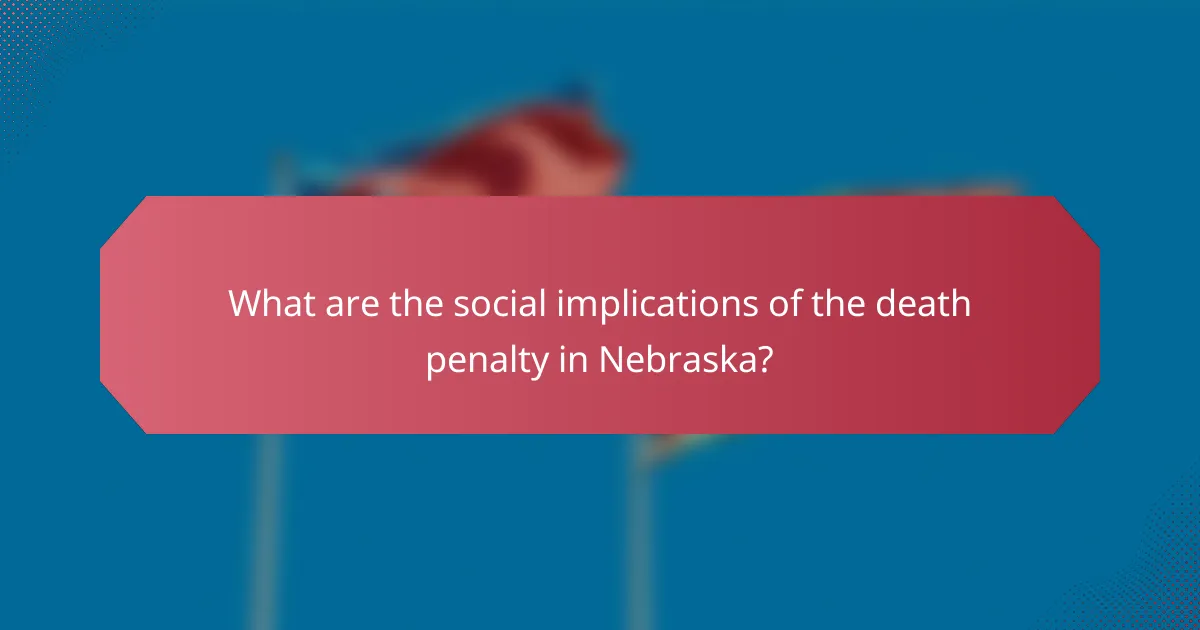
What are the social implications of the death penalty in Nebraska?
The social implications of the death penalty in Nebraska include divisive public opinion and ethical concerns. Public sentiment is often polarized, with some supporting capital punishment as a deterrent to crime. Others argue it is inhumane and prone to judicial errors. The death penalty can exacerbate societal inequalities, as marginalized groups are disproportionately affected. Additionally, it can strain community resources, including legal and correctional systems. Nebraska’s history of moratoriums and legislative changes reflects ongoing debates about morality and justice. In 2015, the Nebraska legislature voted to abolish the death penalty, highlighting shifting attitudes toward this practice.
How do various community groups view the death penalty?
Various community groups have differing views on the death penalty. Advocacy groups such as the American Civil Liberties Union oppose it, citing moral and ethical concerns. They argue it is inhumane and prone to errors. Religious organizations, like the Catholic [censured], also condemn the death penalty, emphasizing the sanctity of life. Conversely, some law enforcement groups support it, believing it serves as a deterrent against serious crimes. Public opinion varies, with surveys indicating fluctuating support based on recent high-profile cases. In Nebraska, community discussions have highlighted these diverse perspectives, reflecting broader national debates on capital punishment.
What arguments do opponents of the death penalty present?
Opponents of the death penalty argue that it is inhumane and leads to wrongful executions. They highlight that the risk of executing innocent people is significant, with studies indicating that around 4% of death row inmates are likely innocent. Additionally, they claim that the death penalty does not deter crime more effectively than life imprisonment. Economic factors are also cited, as the costs associated with death penalty cases are often higher than those for life sentences. Furthermore, opponents argue that the death penalty disproportionately affects marginalized communities, raising concerns about systemic bias. Lastly, they emphasize that life sentences without parole provide a more humane alternative while ensuring public safety.
What are the main arguments in favor of maintaining the death penalty?
The main arguments in favor of maintaining the death penalty include deterrence, retribution, and closure for victims’ families. Proponents argue that the death penalty serves as a deterrent against serious crimes. Studies, such as one by the National Research Council, suggest that capital punishment may reduce homicide rates. Additionally, supporters believe that it provides a sense of justice and retribution for heinous acts. This aligns with the belief that certain crimes warrant the ultimate punishment. Lastly, many families of victims express that the death penalty offers closure and a sense of justice. These arguments collectively reinforce the case for retaining the death penalty within the legal system.
How does Nebraska’s death penalty history reflect broader national trends?
Nebraska’s death penalty history reflects broader national trends through its legislative changes and public opinion shifts. In 1972, the U.S. Supreme Court’s decision in Furman v. Georgia led to a temporary halt of the death penalty nationwide. Nebraska responded by abolishing it in 1979, mirroring states that sought to comply with the ruling.
However, public support for capital punishment surged in the 1980s and 1990s. In 1993, Nebraska reinstated the death penalty, aligning with the national trend of reintroducing capital punishment amid rising crime rates.
In recent years, Nebraska’s attempts to abolish the death penalty again reflect a growing national sentiment against it. In 2015, the state legislature voted to repeal the death penalty, although the governor vetoed the bill. This back-and-forth illustrates the ongoing debate about capital punishment across the United States, where several states have moved towards abolition or moratoriums.
Overall, Nebraska’s death penalty history exemplifies how local policies can echo national trends in criminal justice, public sentiment, and legislative actions.
What similarities exist between Nebraska and other states regarding death penalty cases?
Nebraska shares several similarities with other states regarding death penalty cases. Many states, including Nebraska, have faced legal challenges related to the constitutionality of the death penalty. States often experience public debates over the morality and effectiveness of capital punishment. Additionally, the process of appeals in death penalty cases is lengthy and complex across the board. Nebraska and other states utilize lethal injection as the primary method of execution. There is also a trend of states placing moratoriums on executions, reflecting changing public opinion. Furthermore, issues of racial bias in sentencing are prevalent in both Nebraska and other states. Finally, the costs associated with death penalty cases are consistently high, impacting state budgets similarly nationwide.
How have national legal trends influenced Nebraska’s death penalty laws?
National legal trends have significantly influenced Nebraska’s death penalty laws. The U.S. Supreme Court’s decisions have shaped state practices regarding capital punishment. For instance, the 1972 case Furman v. Georgia led to a temporary halt of the death penalty across the nation. This case prompted Nebraska to revise its death penalty statutes to comply with constitutional standards.
Moreover, the 2002 case Atkins v. Virginia prohibited executing individuals with intellectual disabilities. Nebraska subsequently adjusted its laws to align with this ruling. In recent years, national movements toward abolition have also impacted public opinion in Nebraska. The state’s legislature has debated and passed measures reflecting these trends, including attempts to repeal the death penalty.
These legal precedents and shifts in societal attitudes continue to shape Nebraska’s approach to capital punishment.
What practical considerations should be taken into account regarding Nebraska’s death penalty?
Practical considerations regarding Nebraska’s death penalty include legal, ethical, and financial factors. Legal considerations involve the constitutionality of the death penalty and its application. Ethical considerations encompass moral debates about capital punishment’s justification. Financial considerations look at the costs associated with trials, appeals, and incarceration.
In Nebraska, the cost of death penalty cases is significantly higher than life imprisonment without parole. A 2015 study indicated that death penalty cases cost taxpayers about $1.2 million more per case than non-death penalty cases. Additionally, the lengthy appeals process can prolong cases for years, impacting judicial resources.
Public opinion also plays a role in shaping policies around the death penalty. Surveys show fluctuating support for capital punishment among Nebraskans. These factors collectively influence the ongoing discussions about the future of the death penalty in the state.
The main entity of the article is Nebraska’s death penalty history, focusing on notable cases and their implications. Key cases discussed include the executions of Charles Starkweather and Carey Dean Moore, which highlight the state’s evolving stance on capital punishment. The article outlines significant legislative changes, public opinion trends, and landmark rulings from the Nebraska Supreme Court that have shaped the legal landscape surrounding the death penalty. Additionally, it examines the social implications and practical considerations of capital punishment in Nebraska, reflecting broader national trends and ongoing debates about its morality and effectiveness.
